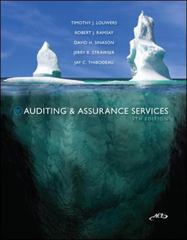Question
George, 68, decides to retire from farming and is considering selling his farm. The farm has $100,000 basis and a $400,000 FMV. George;s two sons
George, 68, decides to retire from farming and is considering selling his farm. The farm has $100,000 basis and a $400,000 FMV. George;s two sons are not interested in farming. Both sons have large families and would like to own house suitable for their needs. The Iowa Corporation is willing to purchase Georges farm. Georges tax advisor suggest that Iowa Corporation should buy the two houses the sons want to own for $400,000 and then exchange the houses for Georges farm. After the exchange, George could make a gift of the houses to his sons. If the transactions are executes as suggested by the tax advisor, Georges recognized gain will be $300,000. Explain why the transaction does not qualify a a like-kind exchange. George wants the exchange to qualify as a like-kind exchange and still help his sons obtain the houses. What advice do you have for him?
A partial list of research sources is:
Dollie H. Click, 78 T.C. 225 (1982)
Fred S. Wagensen, 74 T.C. 653 (1980)
Step by Step Solution
There are 3 Steps involved in it
Step: 1

Get Instant Access to Expert-Tailored Solutions
See step-by-step solutions with expert insights and AI powered tools for academic success
Step: 2

Step: 3

Ace Your Homework with AI
Get the answers you need in no time with our AI-driven, step-by-step assistance
Get Started


